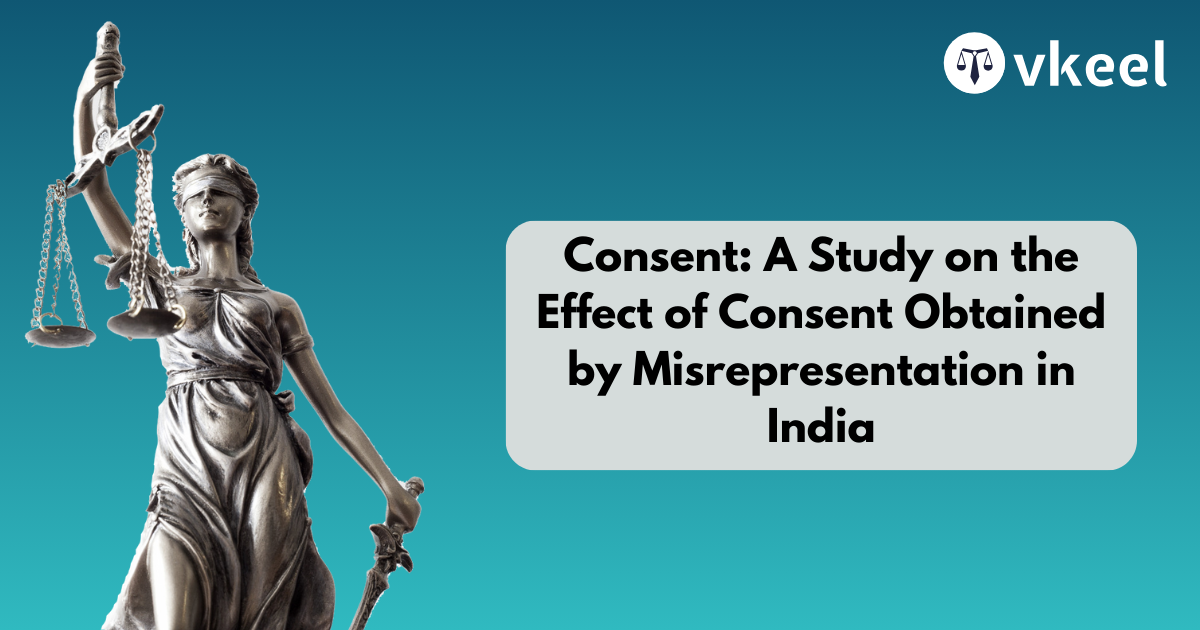Consent: A Study on the Effect of Consent Obtained by Misrepresentation in India
By Himanshu Kumar
Table of Contents
Introduction
Consent is a fundamental principle in the realm of contracts and legal agreements. In India, the legal framework surrounding consent is well-defined, primarily governed by the Indian Contract Act, 1872. However, the purity of consent can be tainted by various factors, including misrepresentation.
The primary reason for obtaining consent under the law is to ensure that all parties involved in a contract or agreement are fully aware and in agreement with the terms and conditions set forth. Consent signifies a mutual understanding and willingness to engage in a legal relationship, ensuring that the contract is founded on free will and not on coercion, undue influence, or misrepresentation. This foundational principle of consent underpins the legitimacy of legal agreements, ensuring that they are fair, just, and equitable. Without genuine consent, the very basis of the contractual agreement is compromised, leading to potential disputes and legal complications.
Moreover, obtaining consent serves to protect the autonomy and rights of individuals, recognizing their capacity to make informed decisions. It promotes transparency and trust between parties, essential for maintaining the integrity of legal and commercial transactions. By mandating clear, unequivocal consent, the law seeks to prevent exploitation and safeguard against any form of deception or manipulation. This legal requirement upholds the ethical standards within various domains, including contracts, medical procedures, and data privacy, reinforcing the principle that all actions and agreements should be voluntary and well-informed.
Understanding Consent and Misrepresentation
Consent under Section 13 of the Indian Contract Act, 1872, means that two or more persons are said to consent when they agree upon the same thing in the same sense (consensus ad idem). For consent to be valid, it must be free, as stipulated under Section 14 of the Act. Free consent is absent if it is caused by coercion, undue influence, fraud, misrepresentation, or mistake.
Misrepresentation, as per Section 18 of the Indian Contract Act, refers to a false statement made innocently without any intention to deceive the other party. Misrepresentation can occur in three ways:
- Positive assertion of a fact, which is not true, though the person making it believes it to be true.
- Any breach of duty which, without an intent to deceive, gains an advantage by misleading another to his prejudice.
- Causing a party to make a mistake about the subject matter of the contract.
Legal Provisions Regarding Misrepresentation
Section 19 of the Indian Contract Act, 1872 addresses the consequences of agreements affected by misrepresentation. It states that when consent to an agreement is caused by coercion, fraud, or misrepresentation, the agreement is a contract voidable at the option of the party whose consent was so obtained. The party whose consent was not free can insist that the contract be performed or rescind it.
Case Laws on Misrepresentation and Consent
- Derry v. Peek (1889): Although not an Indian case, this English case laid the foundation for understanding misrepresentation. The House of Lords held that a false statement made without reasonable grounds for believing it to be true constitutes fraud, not merely misrepresentation.
- Ratanlal Bangal v. Keshavlal Brahman (1941): The Bombay High Court emphasized that misrepresentation, though innocent, can render the contract voidable at the instance of the party misled by such misrepresentation.
- Madhub Chunder v. Rajcoomar Doss (1874): This case highlighted that for misrepresentation to invalidate consent, it must be shown that the misled party acted upon the misrepresentation and that it was material to the contract.
- Bala Krishna v. Gopal (1949): The Madras High Court ruled that a misrepresentation must be of a material fact. The misled party must demonstrate that the misrepresentation influenced their decision to enter the contract.
Impact of Misrepresentation on Contracts
When consent is obtained through misrepresentation, the affected party has several remedies:
- Rescission: The misled party can rescind the contract, rendering it void ab initio (from the beginning). This option is available under Section 19 of the Indian Contract Act.
- Restitution: The parties are restored to their original positions before the contract. Any benefits conferred under the contract must be returned.
- Damages: Although misrepresentation is distinct from fraud, damages may be claimed if the misled party suffers a loss due to reliance on the misrepresentation.
Recent Amendments and Developments
The Indian Contract Act, 1872 has seen several amendments and judicial interpretations to align with modern commercial practices. Key amendments include:
- The Specific Relief (Amendment) Act, 2018: This amendment redefined the scope of specific performance as a remedy. It emphasized the enforcement of contractual terms and made specific performance a preferred remedy over damages in certain circumstances. Although not directly related to misrepresentation, it affects contracts where misrepresentation might have played a role.
- Consumer Protection Act, 2019: This Act provides an additional layer of protection to consumers against unfair trade practices and misrepresentation. Consumers can seek redressal through consumer courts, which offer quicker resolutions compared to traditional courts.
- Introduction of E-contracts: With the rise of digital transactions, the Information Technology Act, 2000, and subsequent amendments have recognized the validity of e-contracts. Misrepresentation in digital contracts is treated with the same seriousness as in traditional contracts.
Case Analysis: Significant Judgments Post-Amendments
- Eureka Forbes Ltd. v. Allahabad Bank (2020): In this case, the National Consumer Disputes Redressal Commission (NCDRC) ruled that misrepresentation in advertising led to a voidable contract. The judgment underscored the importance of accurate representation in consumer contracts.
- Sanjay Kaul v. M/S. Lic Housing Finance Ltd. (2021): The Delhi High Court reiterated that any misrepresentation in the terms of a loan agreement could render the contract voidable at the borrower’s option. The court emphasized the lender’s duty to disclose all material facts clearly.
- Dr. A. R. Krishna v. L&T Finance Ltd. (2022): The court ruled in favor of the plaintiff, who claimed that misrepresentation about the terms and conditions of a loan agreement led to consent obtained through misrepresentation. The court ordered restitution and compensation for losses incurred.
Conclusion
Consent obtained by misrepresentation can significantly impact the validity of contracts in India. The legal framework under the Indian Contract Act, 1872, provides robust mechanisms to address such issues, ensuring that parties are not unfairly disadvantaged. Landmark judgments have further clarified the nuances of misrepresentation, balancing the need for fair dealing with the protection of parties’ rights.
Recent amendments and developments, including consumer protection laws and the recognition of e-contracts, have adapted the legal landscape to contemporary needs. These changes emphasize the importance of transparency and accountability in contractual dealings.
In conclusion, while misrepresentation remains a complex area of contract law, the evolving jurisprudence and legislative amendments continue to fortify the principles of free consent and fair trade, reinforcing trust and integrity in contractual relationships in India.
Disclaimer:
The information provided in the article is for general informational purposes only, and is not intended to constitute legal advice or to be relied upon as a substitute for legal advice. Furthermore, any information contained in the article is not guaranteed to be current, complete or accurate. If you require legal advice or representation, you should contact an attorney or law firm directly. We are not responsible for any damages resulting from any reliance on the content of this website.










